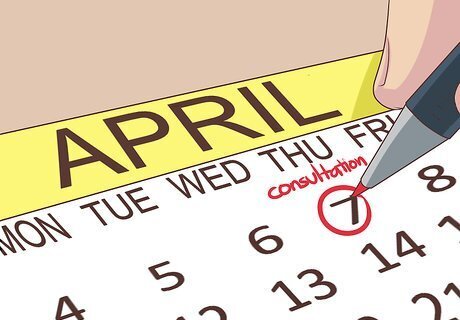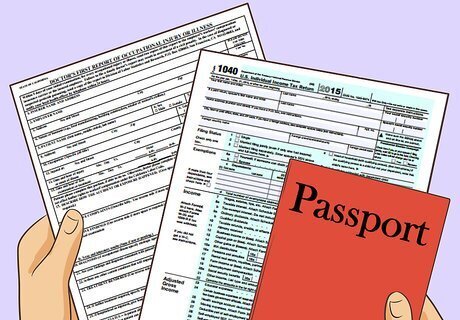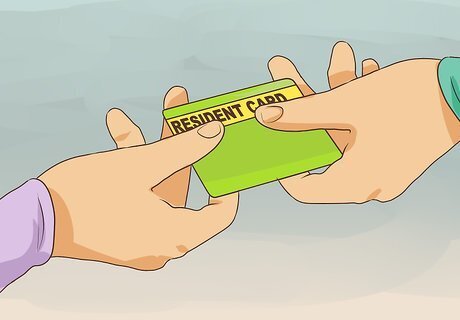
views
X
Research source
[2]
X
Research source
[3]
X
Trustworthy Source
US Citizenship and Immigration Services
U.S. government agency in charge of the naturalization and immigration systems
Go to source
Reviewing Your Paperwork

Go through your financial figures and immigration history. Any information you've provided to the USCIS during the application process is fair game at the interview, so read through everything you've submitted. During the interview, the officer will ask you questions about the information on your application, so make sure you know exactly what was written. It's not going to help you if you give a different answer in your interview than you gave on your application forms. You don't necessarily have to memorize exact financial figures, but you should have dates and descriptions firm in your mind.

Check documents and information submitted by your sponsor. Your sponsor filed a petition for you and is supporting your green card application. They may or may not be present at the interview, but you need to understand the information provided in those documents. You need to know what your sponsor said so you can be sure not to give a conflicting answer. Particularly if you've applied for an adjustment of immigration status because of marriage, the immigration officer will carefully scrutinize the information provided by you and your spouse. Discrepancies could signal to the officer that your marriage is fraudulent. At the very least, differences between the information you've provided and the information your sponsor has provided will delay your application because the officer will have to review supporting documentation to determine which information is correct.

Make note of any changes or discrepancies. If anything has changed since you initially filed your application, you'll need to explain what happened. These changes won't necessarily put your application at risk, but you'll need to be able to explain them and provide documentation to back up the changed information. There's nothing particularly alarming about these changes, and generally it won't affect whether your application gets approved. On the contrary, particularly if you filed your application and began the process months, or even years, before your interview, some changes will be expected. For example, if you or your spouse has a new job, you should bring a letter from the new employer along with recent check stubs. You can hasten the approval process by gathering documents that support any of the changed information. The immigration officer will ask for them anyway, and having them with you means you don't have to mail them later and then wait that much longer for your green card as a result.

Decide if you need an interpreter. While some immigration officers speak other languages, you can't request someone specifically. Even though you may be proud of your ability to speak and understand English, this isn't the time to take chances. Keep in mind you don't have to speak English to get a green card. You may think your proficiency in English will impress the immigration officer, but if you aren't truly fluent, bring a translator. Your translator must be fluent in both English and your native language, and must be a US citizen or lawful permanent resident over the age of 18. You can bring a family member or friend – you don't have to hire a professional translator. However, keep in mind that if you applied for an adjustment of immigration status because of marriage, your spouse cannot act as your translator. The USCIS wants to be able to compare your answers and ensure there are no indications of marriage fraud. In addition, any documents you bring to the interview must be fully translated into English. This translation must be accompanied by a statement from the translator assuring the accuracy of the translation.
Consulting an Attorney

Search for immigration attorneys in your area. If you haven't already hired an attorney to guide you through the application process, you may want to talk to someone before you attend your hearing. If you know of a nonprofit organization that serves immigrants in your area, you might want to start there. Organizations may focus on immigrants from particular countries, which increases the chances of you being able to get information in your native language. Nonprofits also may be able to connect you to free or low-cost legal assistance – they may even provide legal assistance themselves. You also can find immigration attorneys by doing a search online. Try the website of your state or local bar association, which typically has a searchable directory of its members. However, research any attorneys you find online and find out more about their background and experience before you decide to call them.

Schedule an initial consultation. Immigration attorneys typically offer a free initial consultation. If you're not sure whether you want to hire an attorney, the initial consultation can give you an opportunity to learn more about what an attorney can do for you. If you're looking to hire an attorney, it's a good idea to schedule initial consultations with three or four of them. Then you can compare and contrast to find the one you like the best. However, if you just want some tips on how to handle your interview, it may not be necessary to talk to several attorneys. Depending on where you live, you may even be able to find an attorney who speaks your native language. This can often be ideal, since some details will always get lost in translation. If you plan on bringing a translator or have any additional needs, let the attorney's staff know when you schedule the initial consultation so they can prepare for you.

Write a list of questions you want to ask. Immigration attorneys typically give the same information to all potential clients who schedule an initial consultation. They may not discuss things that are important to you. Keep in mind that when you go to an initial consultation, the attorney's main goal will be to convince you to hire him or her. You'll have to ask detailed and specific questions to get much out of the initial consultation without hiring the attorney. Writing your questions down can help you remember everything and keep you from getting distracted or side-tracked. At a minimum, you need to find out how many immigration cases similar to yours the attorney has handled, and what the outcome of those cases was.

Send the attorney any requested documents or information. When you schedule your initial consultation, the attorney may require basic information about your case before the interview. Provide this information as soon as possible so the attorney has time to review your case and tailor the initial consultation specifically to you. At a minimum, attorneys typically will want a copy of your application, and any notices you've received from USCIS regarding the status of your application. You may also want to prepare a brief timeline for the attorney so they can understand your immigration history and how long you've been waiting for your green card to be approved.

Attend your meeting. Unless the attorney tells you otherwise, allow at least 30 minutes to an hour for your initial consultation. Bring your application and any notices or other documents you've received from USCIS along with you. If you're considering hiring an attorney, be sure to ask them about fees so you can figure out whether they will fit into your budget. The attorney may not be able to answer all your questions during the initial consultation, or prepare you for your interview to your satisfaction. If this is the case, find out if you can hire the attorney solely to prepare you for the interview, or to attend the interview with you. You also want to pay attention to how the attorney makes you feel. If you intend to hire the attorney to represent you, he or she should be someone with whom you feel comfortable.

Decide whether you want to have an attorney at your interview. Even if you don't want to hire an attorney to represent you through your entire immigration case, you can still hire someone just to attend the interview with you. If you want the attorney to attend your interview, let them know as soon as possible. They will need to file an appearance form with USCIS prior to the date of your interview. Make sure the retainer agreement you sign with the attorney explicitly states that you are hiring them only for your adjustment of immigration status interview, and not to represent you for your whole immigration case. However, keep in mind that after the interview you'll be on your own. If the officer needs you to submit additional documentation, it will be your responsibility to get that done.
Attending Your Interview

Gather originals of identification and immigration documents. Your notice from USCIS should include a list of documents you're expected to bring with you to your interview. At a minimum, you'll need to bring your passport and any papers related to your immigration case. Be sure to bring any required reports, such as a doctor's report from your medical examination, that you haven't already submitted. You also will need employment information, including a letter from your employer and your most recent check stubs. If a tax year has passed since you filed your application, you also should bring a copy of your tax returns. For adjustment of status interviews based on marriage, you'll need your original marriage certificate and all documents that provide evidence of your shared life together, such as a copy of your lease or mortgage, joint bank account statements, and the like.

Dress appropriately. The interview is not a court proceeding, so you don't need to wear a business suit. However, you still need to dress in neat, conservative clothing. Something you'd wear to a church service or a job interview is appropriate. You don't want to wear graphic T-shirts or anything with large advertising emblems or slogans. As tempting as it may be to dress patriotically – for example, by wearing a stars-and-stripes shirt or tie – don't do it. Show your love for America in your statements and your desire to become a permanent resident, not through your attire. Keep in mind that the interview likely will take place in a small, enclosed office. Avoid wearing heavy cologne or perfume that might bother the immigration officer.

Arrive early. Even though you'll probably have to wait awhile, you still want to show up at least 15 minutes before the time stated on your interview notice. You'll have to go through security at the USCIS field office and find the correct office. Typically, you'll be directed to a waiting room where you'll sit until the immigration officer calls your name. Expect to wait for awhile, despite the time on your notice. Make sure you eat a full meal before your interview. You may have to wait awhile, and you typically aren't allowed to bring food into the office, so snacks are out of the question. You might want to bring a book or something to read while you wait, if you need something to pas the time. You can also use the waiting time to go over all your documents and information one more time.

Answer the immigration officer's questions. When the immigration officer calls your name, you'll be taken to a private office. The officer will check your identification and swear you in, as well as anyone with you such as your attorney or your translator. Keep in mind that you are under oath. Answer all questions as completely and honestly as you can, but don't provide additional information beyond the question that was asked. If you don't understand a question, ask the officer for clarification. Don't attempt to answer a question if you're not sure exactly what was asked. Likewise, if you don't know the answer to a question. Simply say "I don't know." The officer may ask additional questions to follow up, or let the matter drop. But don't try to make up something you think the officer wants to hear.

Submit requested documents. If the immigration officer needs additional documents that you didn't have with you at the interview, you'll get a list. It is your responsibility to mail these documents to the officer by the deadline he or she gives you. This often happens if you indicated something had changed since the time you submitted your initial application, but didn't bring documents with you to support the new information. The officer will give you a list of specific documents he or she needs before a decision on your application can be made. The list will include the address to which you must mail your documents and the date by which they must be received.

Receive your green card. Even if the officer doesn't need any additional information or documents to process your application, your green card won't be issued at the interview. You'll receive a temporary stamp. Your green card will follow in the mail within a few weeks of the date of your interview. Typically, the officer will stamp your passport with a temporary residency stamp. Keep in mind that this is not your green card, and does not mean you have permanent resident status yet. If 90 days pass and you have yet to hear anything, you may want to go to the USCIS website and schedule an InfoPass appointment to discuss the status of your case.




















Comments
0 comment